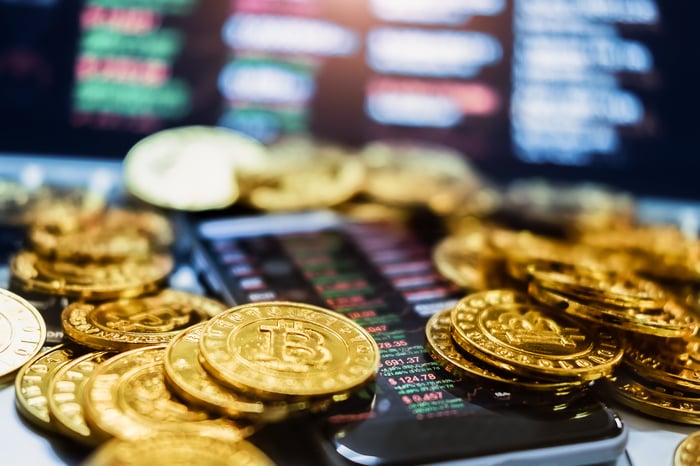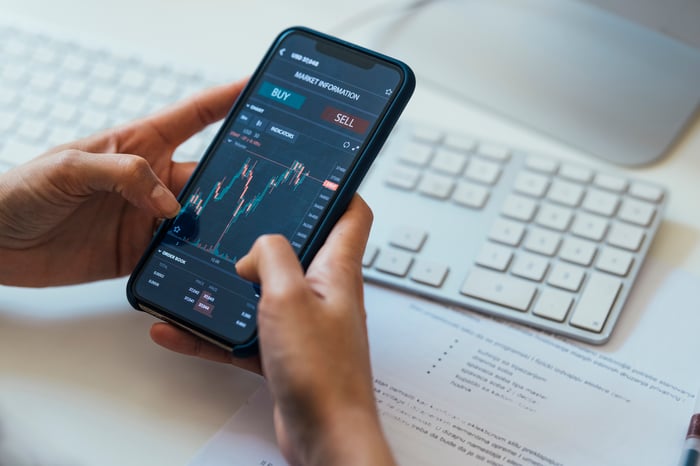For more than 18 months, there's been little that's stood in the way of the benchmark S&P 500 reaching new highs. Since hitting its coronavirus pandemic low on March 23, 2020, the widely followed index has doubled in value and marked the strongest bounce-back rally from a bear-market bottom of all time.
But even when Wall Street is running on all cylinders, it doesn't mean every popular stock is worth buying. The following five stocks are garnering a lot attention from the investment community, but they should be avoided like the plague in October.

Image source: Getty Images.
AMC Entertainment
Movie theater chain AMC Entertainment (AMC 13.76%) is going to top the list of stocks to avoid like the plague every single month until either its operating performance dramatically improves or its share price falls back to the mid-single digits. Neither scenario is close to being met at the moment.
Even before the pandemic struck, the movie theater industry was losing ground. Since selling 1.58 billion tickets domestically in 2002, box office ticket sales have declined at a steady pace. By 2019, ticket sales and inflation-adjusted box office gross were both down 22% from 2002. The ability to stream movies online, and substantially reduced theatrical exclusivity (30 or 45 days, instead of 75 to 90 days prior to the pandemic), virtually ensure that the movie theater industry will continue to shrink over time.
AMC's issues are magnified by a debt- and lease-liability-laden balance sheet that the company likely has no recourse to fix. When June ended, it had nearly $5.5 billion in corporate borrowings and $4.89 billion in long-term lease liabilities, and it owed $420 million in deferred rent. While the company did have $2.023 billion in liquidity ($1.81 billion in cash), it's also burned through $576.5 million in cash in the first six months of the year. AMC has no ability to sell common stock to raise capital, either.
Though a mountain of unsubstantiated claims has surrounded AMC since February, the bond market tells no lies. More than $1 billion in aggregate debt due in 2026-2027 is trading between 69% and 74% of par value, signaling the very real possibility of a future debt default.

Image source: Getty Images.
Coinbase Global
There are a lot of ways for investors to put their money to work in the cryptocurrency space. In my view, buying premier crypto brokerage and ecosystem Coinbase Global (COIN -4.26%) is a bad idea.
There's no denying that Coinbase has delivered some insane growth over the past year. In the second quarter, it reported $2.03 billion in net sales and $462 billion in quarterly trading volume. Comparatively, it only generated $178 million in revenue and oversaw $28 billion in trading volume in the year-ago period. Coinbase is the unquestioned most popular crypto trading platform.
However, nothing is preventing other brokerage platforms from undercutting Coinbase's transaction fees. We've watched fee-based trading margins deteriorate over time for traditional online stock brokerages, and we'll likely see the same thing happen with cryptocurrency brokerages as more players enter the space.
Furthermore, Coinbase is heavily reliant on trading volume in Bitcoin and Ethereum to drive sales and profits. Both of these digital currencies are dependent on investor sentiment, rather than anything fundamental, to drive their prices higher. The last time Bitcoin entered a protracted bear market -- something that tends to happen every few years -- Coinbase saw its sales fall by nearly 50%.

Image source: Getty Images.
Ocugen
Generally speaking, coronavirus disease 2019 (COVID-19) stocks have been on fire. This includes the drug developers making the vaccines designed to slow or halt disease transmission. But not all COVID-19 vaccine developers will be winners. Clinical-stage biotech stock Ocugen (OCGN -0.16%) is one ultra-popular vaccine stock that would be worth avoiding in October (and well beyond).
The buzz surrounding Ocugen has to do with a commercialization agreement the company forged with India's Bharat Biotech for COVID-19 vaccine Covaxin. Bharat conducted a large-scale study in India that demonstrated a nearly 78% vaccine efficacy for 25,800 adult trial participants. Considering how many billions of doses still need to be administered worldwide, there's plenty of room for additional players in the COVID-19 vaccine space.
The problem for Ocugen is that its market for Covaxin is limited. The commercialization agreement with Bharat Biotech only covers the U.S. and Canada. The U.S. government purchased more than enough initial doses from drugmakers to inoculate all eligible individuals. AstraZeneca and Novavax are likely to receive emergency-use authorization in the U.S., as well. This means five major drug developers will be on pharmacy shelves long before Ocugen could ever attempt to commercialize Covaxin in the U.S.
It's a similar story in Canada, with our neighbor to the north spending billions to stockpile COVID-19 vaccines for its citizens. It's unclear if Covaxin, which offered modest initial vaccine efficacy compared to the likes of Moderna, Pfizer/BioNTech, and Novavax, will ever be necessary in the U.S. or Canada.

Image source: Getty Images.
GameStop
Video game and accessories retailer GameStop (GME 2.68%) is yet another meme stock investors should avoid like the plague in October. Meme stocks are companies lauded for the social media buzz they create, rather than their operating performance.
Unlike AMC, GameStop does have some factors working in its favor. For instance, management was able to raise enough capital via stock offerings to wipe out the company's existing debt and build up a sufficient cash position to tackle future growth initiatives. Additionally, the digital gaming market is expected to grow over time, which is more than can be said for the movie theater industry.
However, GameStop has a long way to go before its own needle is pointing in the right direction. For more than two decades, the company has been reliant on its brick-and-mortar retail presence. Though this was a profitable endeavor for quite some time, GameStop's previous management team failed to react quickly enough to a shift toward digital gaming. The company will be closing its physical stores for years to come to reduce its annual expenditures and push back into profitability.
The other issue is that GameStop's new management team hasn't exactly laid out a concrete plan on how it'll turn things around. We know there's an increased focus on e-commerce as gaming goes digital, but any other growth initiatives remain a mystery to Wall Street and investors.
With sales expected to be relatively stagnant for years, GameStop makes for an easy stock to avoid.

Image source: Getty Images.
Robinhood Markets
Lastly, online investing platform Robinhood Markets (HOOD 1.13%) should be actively avoided by investors in October.
Robinhood has been an exceptionally popular investing platform for retail investors. At the end of June, the company had 22.5 million fully funded accounts and a little over $100 billion in assets under custody. For comparison, Robinhood had fewer than 10 million fully funded accounts, as of June 30, 2020. As volatility picked up on Wall Street, retail investors flocked to Robinhood to take advantage of its commission-free trades, fractional share investing, and gifting of free shares of stock to new members.
Although revenue is pointing in the right direction, Robinhood has two red flags that make it worth avoiding. First, its sales are highly concentrated in the hands of a few market makers. Since it's a commission-free platform, Robinhood generates a lot of its revenue from selling payment for order flow (PFOF). While it's unlikely that market makers would stop purchasing PFOF from Robinhood, the door is open for such an occurrence.
What's far more worrisome is the backlash the company is facing from retail investors concerning trading restrictions briefly put in place in late January and early February. Financial regulations require brokerages to maintain minimum liquidity requirements. Given the volatility stocks like GameStop and AMC experienced during the short-squeeze bonanza, Robinhood simply didn't have sufficient liquidity to allow full-bore trading. This bad PR for Robinhood isn't going away, and it could seriously hurt the company's near-term growth prospects.


